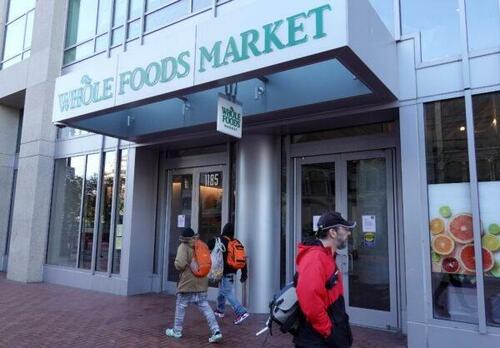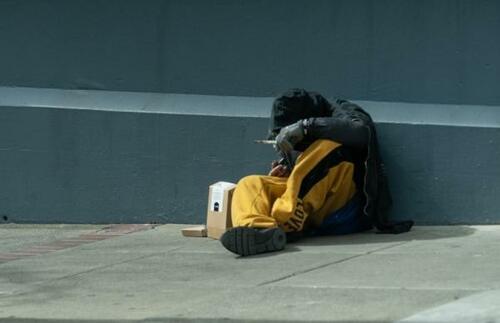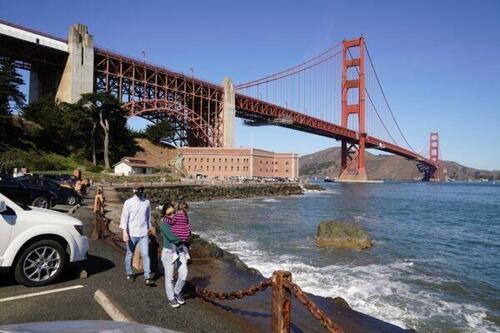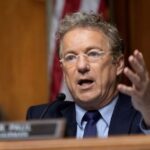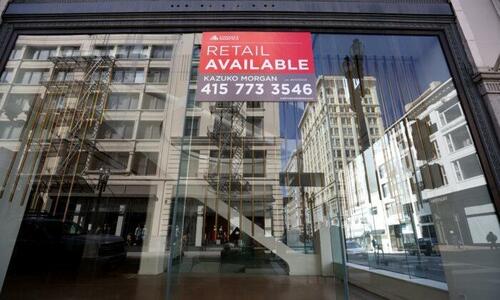
Authored by Siyamak Khorrami via The Epoch Times,
A long-time small-business owner in San Francisco is on the verge of losing his business because, he says, no bank will make him a commercial loan.
Mark E. Sackett, who owns The Box SF, a meeting and events space in a historic building in the city’s South of Market district, said a loan on his business is due in February, but dozens of lenders are turning him down.
“Six have said [they] are not even willing to make a commercial loan in San Francisco,” he said during a recent one-hour episode of EpochTV’s “California Insider.”
Others have told him they won’t make a loan for less than $30 million while another made him an offer, but under poor terms.
“I was grateful to get the offer, but I would be out of business in six or seven months because it [was] an interest-only loan, and my payments would … almost triple from what they are now,” he said.
Such a climate is not only impacting him, but others in the city, such as mom-and-pop corner store owners. Some are already gone.
“It’s whole areas boarded up. Those were all [once] viable businesses,” he said.
Mr. Sackett started his business in 1990. Over the years Apple, Intel, other major tech companies, and even the governor of California—multiple times—have hired him to stage events at The Box SF.
He says he has impeccable credit and kept his business, with two employees, afloat during the pandemic by dipping into his retirement savings, after many, he said, called it quits.
“They just gave up on San Francisco,” he said.
Pedestrians walk by a closed Whole Foods store in San Francisco on April 12, 2023. (Justin Sullivan/Getty Images)
Now, starting to finally recover from the pandemic, he said his business has picked back up, which keeps hundreds of vendors employed—like caterers, florists, bartenders, and tech teams.
“I’m a blip on the radar,” he said. “But I would argue that I am a critical part of the economy, for those hundreds of others that I help stay employed.”
Mr. Sackett says the lenders have become “selfish,” lack the motivation to help smaller entrepreneurs, and may see working with him as too risky, as so many businesses have recently called it quits—or shuttered outlets—in the city, including Walgreens, Nordstrom, Old Navy, and Whole Foods.
He said such thinking is misguided.
“Big companies are now tumbling,” he said, “and I am still here. In my mind, if I was a banker, that would be a pretty good bet for me.”
He also said that the lack of willingness from lenders may have something to do with the media’s current hyper-focus on the city’s ills.
“The national story is San Francisco is crumbling with drugs, crime, car break-ins, homelessness, mental illness and . . . other things,” he said.
“I believe when you have a world-class city that is suffering, the spotlight’s going to be there.”
And then there is all the shoplifting.
Each of the problems, he said, are interrelated, and are contributing to more people and businesses leaving the city. He thinks of the issues in a ranking of severity: drugs and drug dealers are at the top, followed by addicts on the streets, then mental illness issues, and finally the homeless.
Overlaying all of this, he said, is crime.
“If we don’t get a handle on [these issues], we are going to lose more businesses. There’ll be more people exiting California in bigger numbers,” he said.
Frustrated by a lack of progress by nonprofits and politicians, he said he got involved with a local coalition to try and improve conditions in his neighborhood.
The group planted greenery and installed new lights. He also painted a 300-foot mural on the side of his building at 1069 Howard St., where the late publisher William Randolph Hearst printed the San Francisco Examiner in the 1920s.
But now, he says, he has to paint out graffiti every day on the mural, and the plants were stolen—yanked out of the ground.
He said he was also attacked, not long ago, by a man with a switchblade near his business, and a couple of days later someone took a sledgehammer to one of his businesses’ windows. Often, he says, there are people passed out from fentanyl in front of his doorway. And more recently, he intervened—when security guards wouldn’t—to stop a woman from stealing merchandise from a local drug store.
“She was livid at me because I interrupted her robbery,” he said.
“The criminal element has always been [here], but they’re a lot more emboldened now.”
Fentanyl, he said, is a key part of the issue, and goes hand-in-hand with homelessness.
A homeless person in San Francisco on Feb. 23, 2023. (John Fredricks/The Epoch Times)
They are “basically saying ‘screw you’ to the government, ‘screw you’ to the resources offered, because they are dealing drugs out of these tents,” he said. “It’s all over the West Coast.”
At the root of the issue, Mr. Sackett said, is the 9th Circuit Court of Appeals ruling in 2018, that said cities in the Western U.S., which the court oversees, could not clear homeless encampments unless shelter was provided.
Since then, the issue has worsened, he said, even after the city has spent billions.
“We have become, politically in San Francisco, a culture of ‘let’s throw money at it and see if it solves a problem,’” he said.
But the business community, he argued, which took so many hits during the pandemic, has been ignored.
“We’re not getting that kind of money for small businesses,” he said. “We’re not getting that kind of support.”
According to Mr. Sackett, such is the city’s tax base, its economy, and it’s why—along with San Francisco’s natural beauty—tourists the world over visit.
“I don’t even know if the city is aware of businesses like mine,” he said.
“They have not reached out to me. They have not offered to help.”
He said he used to be homesick for San Francisco and couldn’t wait to get home after traveling to places like London, or New York, or even his hometown of Kansas City.
But not anymore.
“I am not thinking like that right now and that saddens me,” he said.
“I want to not have to worry that I have to watch myself when I go out and be worried about my safety … see broken glass on the ground … to see a guy who’s not able to stand because he has foil and a straw and he’s high on fentanyl. I don’t want to see all my neighbors gone and everything boarded up.”
To change things, he said, people need to get more involved and need to vote. Politicians, he said, need to stop thinking about the party, the left, the right, or the middle.
“Vote and hire good people. That’s how I would hire in my business,” he said.
“People are suffering and we need to figure out how to end that suffering.”
He said there is hope.
“Don’t give up. Don’t give up on San Francisco. It’s a world-class city. We have so much good going for us.”
Authored by Siyamak Khorrami via The Epoch Times,
A long-time small-business owner in San Francisco is on the verge of losing his business because, he says, no bank will make him a commercial loan.
Mark E. Sackett, who owns The Box SF, a meeting and events space in a historic building in the city’s South of Market district, said a loan on his business is due in February, but dozens of lenders are turning him down.
“Six have said [they] are not even willing to make a commercial loan in San Francisco,” he said during a recent one-hour episode of EpochTV’s “California Insider.”
Others have told him they won’t make a loan for less than $30 million while another made him an offer, but under poor terms.
“I was grateful to get the offer, but I would be out of business in six or seven months because it [was] an interest-only loan, and my payments would … almost triple from what they are now,” he said.
Such a climate is not only impacting him, but others in the city, such as mom-and-pop corner store owners. Some are already gone.
“It’s whole areas boarded up. Those were all [once] viable businesses,” he said.
Mr. Sackett started his business in 1990. Over the years Apple, Intel, other major tech companies, and even the governor of California—multiple times—have hired him to stage events at The Box SF.
He says he has impeccable credit and kept his business, with two employees, afloat during the pandemic by dipping into his retirement savings, after many, he said, called it quits.
“They just gave up on San Francisco,” he said.
Pedestrians walk by a closed Whole Foods store in San Francisco on April 12, 2023. (Justin Sullivan/Getty Images)
Now, starting to finally recover from the pandemic, he said his business has picked back up, which keeps hundreds of vendors employed—like caterers, florists, bartenders, and tech teams.
“I’m a blip on the radar,” he said. “But I would argue that I am a critical part of the economy, for those hundreds of others that I help stay employed.”
Mr. Sackett says the lenders have become “selfish,” lack the motivation to help smaller entrepreneurs, and may see working with him as too risky, as so many businesses have recently called it quits—or shuttered outlets—in the city, including Walgreens, Nordstrom, Old Navy, and Whole Foods.
He said such thinking is misguided.
“Big companies are now tumbling,” he said, “and I am still here. In my mind, if I was a banker, that would be a pretty good bet for me.”
He also said that the lack of willingness from lenders may have something to do with the media’s current hyper-focus on the city’s ills.
“The national story is San Francisco is crumbling with drugs, crime, car break-ins, homelessness, mental illness and . . . other things,” he said.
“I believe when you have a world-class city that is suffering, the spotlight’s going to be there.”
And then there is all the shoplifting.
Each of the problems, he said, are interrelated, and are contributing to more people and businesses leaving the city. He thinks of the issues in a ranking of severity: drugs and drug dealers are at the top, followed by addicts on the streets, then mental illness issues, and finally the homeless.
Overlaying all of this, he said, is crime.
“If we don’t get a handle on [these issues], we are going to lose more businesses. There’ll be more people exiting California in bigger numbers,” he said.
Frustrated by a lack of progress by nonprofits and politicians, he said he got involved with a local coalition to try and improve conditions in his neighborhood.
The group planted greenery and installed new lights. He also painted a 300-foot mural on the side of his building at 1069 Howard St., where the late publisher William Randolph Hearst printed the San Francisco Examiner in the 1920s.
But now, he says, he has to paint out graffiti every day on the mural, and the plants were stolen—yanked out of the ground.
He said he was also attacked, not long ago, by a man with a switchblade near his business, and a couple of days later someone took a sledgehammer to one of his businesses’ windows. Often, he says, there are people passed out from fentanyl in front of his doorway. And more recently, he intervened—when security guards wouldn’t—to stop a woman from stealing merchandise from a local drug store.
“She was livid at me because I interrupted her robbery,” he said.
“The criminal element has always been [here], but they’re a lot more emboldened now.”
Fentanyl, he said, is a key part of the issue, and goes hand-in-hand with homelessness.
A homeless person in San Francisco on Feb. 23, 2023. (John Fredricks/The Epoch Times)
They are “basically saying ‘screw you’ to the government, ‘screw you’ to the resources offered, because they are dealing drugs out of these tents,” he said. “It’s all over the West Coast.”
At the root of the issue, Mr. Sackett said, is the 9th Circuit Court of Appeals ruling in 2018, that said cities in the Western U.S., which the court oversees, could not clear homeless encampments unless shelter was provided.
Since then, the issue has worsened, he said, even after the city has spent billions.
“We have become, politically in San Francisco, a culture of ‘let’s throw money at it and see if it solves a problem,’” he said.
But the business community, he argued, which took so many hits during the pandemic, has been ignored.
“We’re not getting that kind of money for small businesses,” he said. “We’re not getting that kind of support.”
According to Mr. Sackett, such is the city’s tax base, its economy, and it’s why—along with San Francisco’s natural beauty—tourists the world over visit.
“I don’t even know if the city is aware of businesses like mine,” he said.
“They have not reached out to me. They have not offered to help.”
He said he used to be homesick for San Francisco and couldn’t wait to get home after traveling to places like London, or New York, or even his hometown of Kansas City.
But not anymore.
“I am not thinking like that right now and that saddens me,” he said.
“I want to not have to worry that I have to watch myself when I go out and be worried about my safety … see broken glass on the ground … to see a guy who’s not able to stand because he has foil and a straw and he’s high on fentanyl. I don’t want to see all my neighbors gone and everything boarded up.”
To change things, he said, people need to get more involved and need to vote. Politicians, he said, need to stop thinking about the party, the left, the right, or the middle.
“Vote and hire good people. That’s how I would hire in my business,” he said.
“People are suffering and we need to figure out how to end that suffering.”
He said there is hope.
“Don’t give up. Don’t give up on San Francisco. It’s a world-class city. We have so much good going for us.”
Loading…
